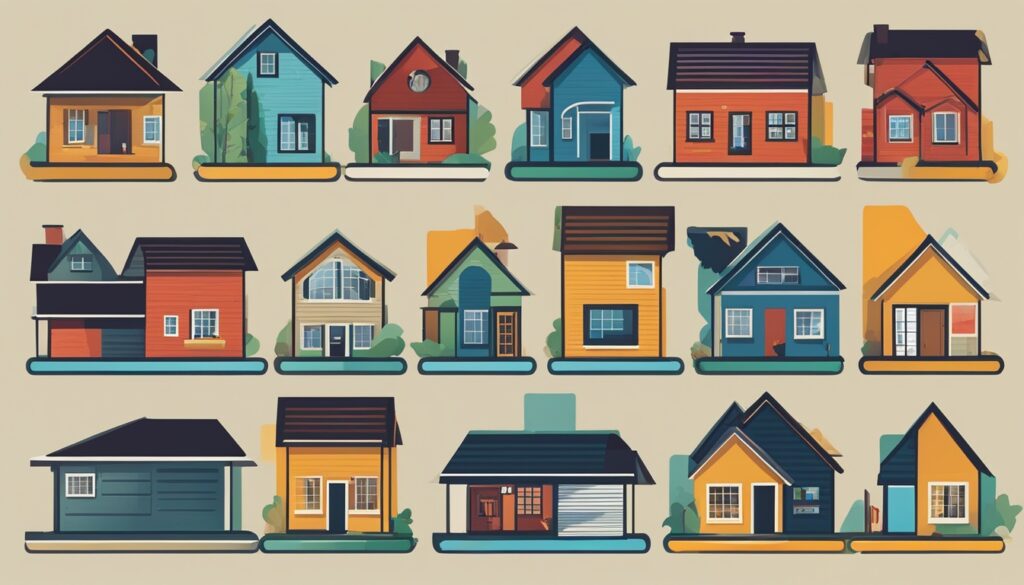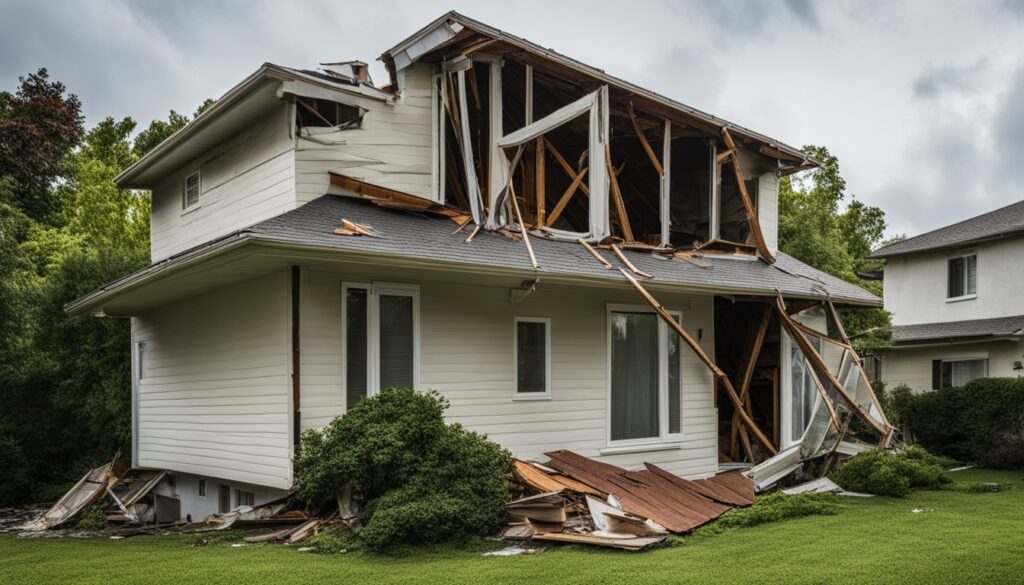Owning a home is a big deal, and you need the right insurance to protect it. Home insurance covers your home, stuff, and you if something bad happens. But, picking the right policy can be hard with all the options and details. This guide will make it easier to choose the right policy for you quote online today standard homeowners homeowners policies may vary by state free quote online homeowners insurance discounts get a free quote online insurance you need.
Key Takeaways
- Understand the different types of home insurance coverage, including dwelling, personal property, liability, and more.
- Determine the appropriate coverage amounts based on the value of your home and belongings.
- Consider additional endorsements, such as scheduled personal property, water backup, and equipment breakdown coverage.
- Evaluate your need for flood and earthquake insurance, which are not typically included in standard home insurance policies.
- Shop and compare quotes from multiple insurance providers to find the best policy at the right price.
- Understand the role of deductibles in your home insurance policy and how they can impact your premium.
- Thoroughly read and understand the details of your home insurance policy before finalizing your coverage.
Understand Homeowners Insurance Coverage
Homeowners insurance can seem complex, but knowing the main coverage types is key. It’s important for protecting your home, your biggest investment. Standard policies have six main types of coverage. These work together to protect your property and your finances.
Dwelling Coverage
This coverage protects your home’s structure, like walls, floors, and the roof. If your home is damaged or destroyed by something like a fire or storm, it helps with repairs or rebuilding.
Personal Property Coverage
This coverage protects your home’s contents, like furniture, electronics, and clothes. If your stuff gets stolen, damaged, or destroyed, it can help you replace it.
Other Structures Coverage
It covers detached buildings on your property, like sheds, fences, or garages. If these structures get damaged or destroyed, this coverage helps with repairs or rebuilding.
Loss of Use Coverage
If an event makes your home not safe to live in, this coverage helps with temporary living costs. This includes things like hotel stays and meals until your home is fixed.
Personal Liability Coverage
This coverage protects you if you’re legally responsible for an injury or damage to someone else’s property. It covers legal costs and any settlements or judgments you might have to pay.
Medical Payments Coverage
This coverage pays for medical bills if someone gets hurt on your property, even if it’s not your fault. It helps cover medical costs for guests who are injured at your home.
Learning about the different home insurance coverage types is the first step to choosing the right policy. By understanding these, you can make sure your home and belongings are well-protected.
Determine the Right Coverage Amounts
Choosing the right home insurance coverage is key. You should have enough dwelling coverage to rebuild your home, also known as replacement cost coverage. This makes sure you’re covered if your home is completely destroyed.
Also, think about how much personal property coverage you need. Making a detailed home inventory helps you figure out what your stuff is worth. This way, you can make sure you have enough insurance for things like jewelry, electronics, and artwork.
Don’t forget about liability coverage. It protects your money if someone gets hurt or their property gets damaged because of you. This coverage is important to keep your finances safe if something unexpected happens.
“Proper coverage amounts are the foundation of a comprehensive home insurance policy. Take the time to assess your needs and ensure you’re fully protected.”
By thinking about your home insurance coverage amounts, home replacement cost, personal property coverage, and liability coverage, you can get a policy that covers what you need. This way, you won’t pay too much for insurance.
Finding the right coverage amounts is just the start of picking the best home insurance. By understanding what you need, you can make sure your home and stuff are safe from surprises.
Consider Additional Endorsements

Standard home insurance might not cover everything you need. That’s where extra endorsements come in. They help protect your home and stuff from many risks.
Scheduled Personal Property Coverage
If you have valuable items like jewelry, art, or collectibles, think about scheduled personal property coverage. This extra coverage gives better protection for these items. It often has higher limits and lower deductibles than basic coverage.
Water Backup Coverage
Water backup coverage is a must-have for homeowners. It covers damage from water backing up through sewers or drains. This can be a big problem and expensive. The coverage helps pay for repairs and cleanup, and covers damage to your stuff too.
Equipment Breakdown Coverage
Our homes are full of complex systems and appliances today. Equipment breakdown coverage protects against sudden failures of these systems. This includes HVAC, electrical, and plumbing. It helps pay for repairs or replacing these essential parts, keeping your home running smoothly.
Looking into these home insurance endorsements can fill gaps in your basic home insurance policy. They give you the full coverage you need to protect your home and belongings.
“Endorsements can be the difference between a claim being covered or not, so it’s important to understand what they offer and how they fit into your overall home insurance protection.”
Evaluate Flood and Earthquake Insurance Needs
Many homeowners find out that standard home insurance doesn’t cover natural disasters like floods and earthquakes. These disasters can cause a lot of damage, leaving homeowners with big financial losses. It’s important to check if you need separate flood and earthquake insurance policies.
Flood insurance is key for homeowners in areas at risk of rising water levels. It covers damage from floods, like water damage from heavy rains, overflowing rivers, or coastal storms. Flood insurance is usually offered by the National Flood Insurance Program (NFIP) or private insurers.
Earthquake insurance helps protect your home and belongings from damage caused by earth movement. It’s especially important for homeowners in areas with a lot of earthquakes, where the risk of damage is higher.
“Homeowners who live in areas with a high risk of natural disasters should carefully assess their coverage needs to ensure they are adequately protected against the financial consequences of these events.”
When thinking about flood and earthquake insurance, look at your home’s location and the history of natural disasters in your area. Think about how these disasters could affect your finances. By understanding your risks and getting the right coverage, you can make sure your home and belongings are safe from unexpected disasters.
Shop and Compare Home Insurance Quotes

Finding the right home insurance policy is crucial for protecting your home. Shopping and comparing quotes can seem tough, but it’s easier with some steps. This way, you get the coverage you need at a good price.
Begin by collecting info about your home, like its age, size, and materials. This helps insurers give you accurate quotes. Then, think about what coverage you need. Decide on the right levels of dwelling, personal property, liability, and other types to fit your needs.
- Contact several home insurance companies for quotes. Be ready to share details about your home and insurance history.
- Look over the home insurance quotes you get. Check the coverage limits, deductibles, and premiums. Find the best mix of protection and cost.
- Use home insurance comparison tools and websites to make researching easier. These can help you quickly find the best options.
- Don’t hesitate to negotiate or ask for discounts. Many insurers offer deals for bundling policies, good credit scores, or home security systems.
| Insurance Provider | Dwelling Coverage | Personal Property | Liability | Annual Premium |
|---|---|---|---|---|
| Company A | $300,000 | $150,000 | $300,000 | $1,200 |
| Company B | $350,000 | $175,000 | $500,000 | $1,400 |
| Company C | $400,000 | $200,000 | $500,000 | $1,600 |
By taking time to shop and compare home insurance quotes, you can find the right policy. It protects your home and your finances. Remember, the cheapest option might not always be the best. Consider coverage and customer service too.
Home Insurance and Deductibles

When looking at your home insurance policy, the deductible is key. It’s the amount you pay before your insurance starts covering costs. By choosing a higher home insurance deductible, you can lower your home insurance premium. But make sure you can afford the higher deductible amount if you need to make a claim.
Some policies have different deductibles for things like hurricanes or windstorms. It’s vital to know the details of your home insurance policy and the deductible options. This ensures you have the right coverage at a good price.
| Deductible Amount | Average Home Insurance Premium |
|---|---|
| $500 | $1,200 |
| $1,000 | $1,100 |
| $2,500 | $950 |
| $5,000 | $800 |
The table shows how a higher home insurance deductible can lower your home insurance premium. But, it’s important to find a balance. You want a deductible you’re okay with and still save on your home insurance premium.
“Choosing the right home insurance deductible is a personal decision that requires careful consideration of your financial situation and risk tolerance.”
Understanding how deductibles affect your home insurance policy helps you make a smart choice. This way, you get the coverage you need without breaking the bank.
Finalize and Read Your Home Insurance Policy

After picking a home insurance policy, you’ll get a home insurance declarations page with key coverage details. It’s important to read your home insurance policy well to know what’s covered and what’s not. Giving wrong info to insurers can lead to denied claims or even fraud charges.
The home insurance declarations page has important info like:
- Your policy number
- The coverage limits for each type of protection, such as dwelling, personal property, liability, and medical payments
- The deductible amounts
- The premium you’ll pay for the policy
- Any endorsements or riders that provide additional coverage
Looking over your home insurance coverage details helps make sure your policy fits your needs. If you have questions or concerns, reach out to your insurance provider for help.
| Coverage Type | Description | Typical Coverage Limits |
|---|---|---|
| Dwelling Coverage | Covers the structure of your home, including the foundation, walls, and roof | Usually 80-100% of the home’s replacement cost |
| Personal Property Coverage | Covers the replacement of your personal belongings, such as furniture, appliances, and clothing | Usually 50-70% of the dwelling coverage limit |
| Liability Coverage | Protects you if someone is injured on your property or you’re found legally liable for damages | Typically $100,000 to $500,000 |
| Medical Payments Coverage | Covers medical expenses for minor injuries to guests on your property, regardless of fault | Usually $1,000 to $5,000 per person |
Your home insurance policy is a legally binding contract. It’s key to understand the home insurance coverage details and follow the terms and conditions. This ensures your claims are handled smoothly.
Home Insurance

Homeowners insurance is key to protecting your biggest investment – your home. It doesn’t matter if you’re new to homeownership or have lived in your home for years. Knowing about the different types of coverage and finding the right policy can lessen the financial blow of unexpected damage or loss.
Dwelling coverage is a main part of home insurance. It covers the physical parts of your home like walls, roof, and foundation. If your home suffers damage from a covered event like a fire or storm, this coverage can help pay for repairs or rebuilding.
Home insurance also covers your personal stuff inside the home. This includes things like furniture, electronics, clothes, and jewelry. If these items get stolen or damaged by a covered event, this coverage can help you replace them.
Other important parts of home insurance include coverage for other structures like a detached garage or shed. It also includes loss of use coverage, which can pay for temporary living expenses if your home is not safe to live in. Personal liability coverage can protect you if someone gets hurt on your property. And medical payments coverage can help pay for medical bills for guests who get hurt at your home.
When looking for home insurance, think about what you need and what you can afford. Things like your home’s age, value, location, and your belongings affect what coverage you need and how much it will cost. By understanding your options and comparing quotes, you can find the homeowners insurance that suits you best.
“Owning a home is a keystone of wealth – both financial affluence and emotional security.”
– Suze Orman, personal finance expert
Home insurance is a key investment in protecting your most valuable asset and giving you peace of mind. By knowing about the different coverage types and choosing the right policy, you can be sure your home and belongings are safe, no matter what the future brings.
Also Read: Dental Insurance: Protect Your Smile
Conclusion
Choosing the right home insurance policy is key to protecting your home. It’s important to know about the coverage options and how much you need. This way, you can find a policy that covers everything at a good price.
Start by looking at different home insurance quotes from various companies. Think about things like deductibles, what’s not covered, and how well the company helps customers. This helps you pick a policy that meets your needs and budget.
It’s also important to check your home insurance policy every year. Change it if your situation changes. With the right insurance, you’ll feel secure knowing your home and things are safe, no matter what happens.
FAQs
Q: What factors should I consider when choosing a homeowners insurance policy?
A: When choosing a homeowners insurance policy, consider the coverage options, policy limits, deductibles, and available discounts. Additionally, assess the market value of your home and any specific risks that may require additional coverage, such as umbrella insurance.
Q: How can I get a homeowners insurance quote online?
A: You can get a homeowners insurance quote online by visiting an insurance agency’s website. Look for options to start your quote, where you will input details about your property and desired coverage to receive a free home insurance quote.
Q: What types of home insurance coverage are available?
A: Homeowners insurance policies typically include coverage for the structure of your home, personal property, liability protection, and additional living expenses. It is important to review the homeowners coverage options and tailor the policy to your needs.
Q: Are there any discounts available for homeowners insurance?
A: Yes, many insurance agencies offer insurance discounts for various factors, such as bundling policies (like auto insurance), having security systems installed, or maintaining a claims-free record. Be sure to ask about home insurance discounts when getting a quote.
Q: What is the importance of policy limits in homeowners insurance?
A: Policy limits define the maximum amount your insurance will pay for a covered loss. It’s crucial to choose limits that reflect the market value of your home and the potential cost of rebuilding or repairing it to ensure adequate protection.
Q: How can I find free online resources for homeowners insurance?
A: You can find free online resources for homeowners insurance by searching for insurance resources on the internet. Many insurance agencies provide informative articles, FAQs, and calculators that can help you understand your options and get a homeowners insurance quote online.
Q: How do I evaluate the damage to my home for insurance purposes?
A: To evaluate damage to your home for insurance purposes, document the damage with photos, gather repair estimates, and maintain records of any previous claims. This information will be helpful when discussing your situation with your insurance agency.
Q: What should I do if I have questions about homeowners insurance?
A: If you have questions about homeowners insurance, consult your insurance agency or refer to the homeowners insurance FAQ section on their website. You can also reach out to customer service representatives who can provide detailed answers to your insurance questions.
Q: How can I use a home insurance calculator?
A: A home insurance calculator helps you estimate the cost of coverage based on factors such as the value of your home, desired policy limits, and applicable discounts. Input your information into the calculator to get a home insurance quote today.
Q: What is the process to start my quote for homeowners insurance?
A: To start your quote for homeowners insurance, visit an insurance agency’s website and look for the option to get a quote. Follow the prompts to input your information, and you will receive a homeowners insurance quote online, often within minutes.
Source Links
- https://www.tdi.texas.gov/tips/home-insurance.html
- https://www.nerdwallet.com/article/insurance/how-to-shop-for-homeowners-insurance
- https://www.bankrate.com/insurance/homeowners-insurance/how-much-homeowners-insurance/